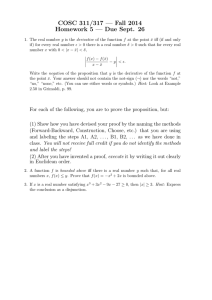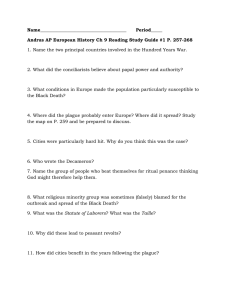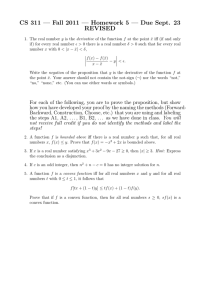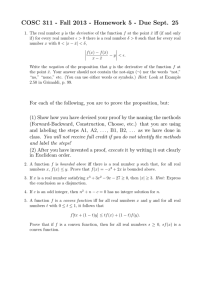24.251#7 Yablo 10/3/11 Empiricist Theories
advertisement
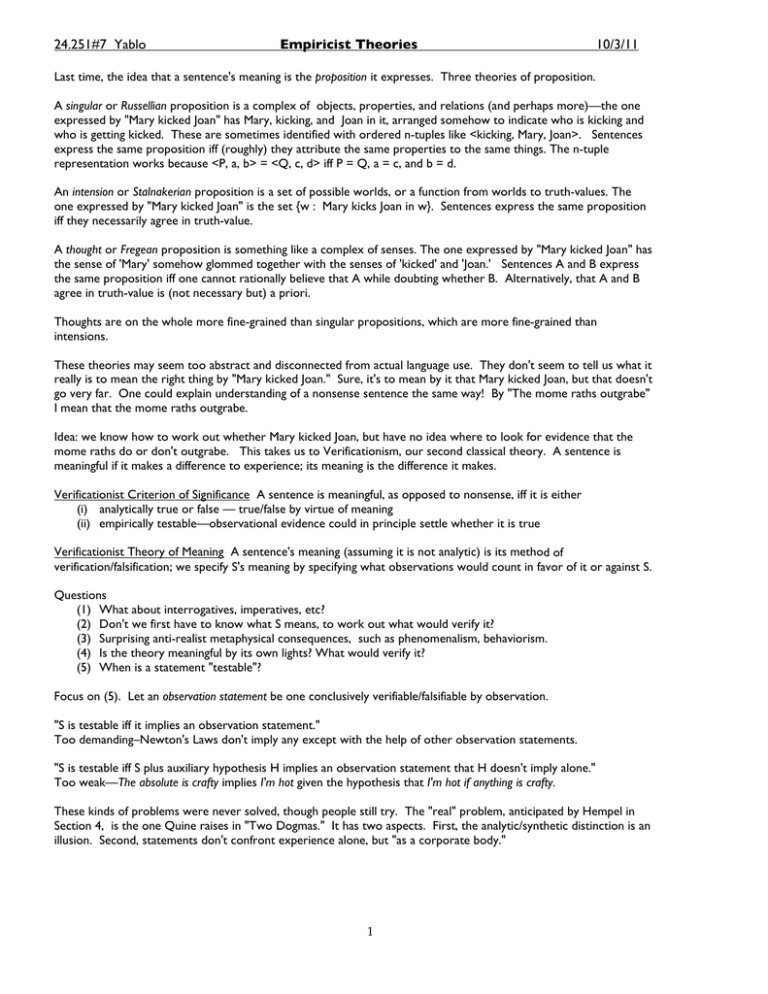
24.251#7 Yablo
Empiricist Theories
10/3/11
Last time, the idea that a sentence's meaning is the proposition it expresses. Three theories of proposition.
A singular or Russellian proposition is a complex of objects, properties, and relations (and perhaps more)––the one
expressed by "Mary kicked Joan" has Mary, kicking, and Joan in it, arranged somehow to indicate who is kicking and
who is getting kicked. These are sometimes identified with ordered n-tuples like <kicking, Mary, Joan>. Sentences
express the same proposition iff (roughly) they attribute the same properties to the same things. The n-tuple
representation works because <P, a, b> = <Q, c, d> iff P = Q, a = c, and b = d.
An intension or Stalnakerian proposition is a set of possible worlds, or a function from worlds to truth-values. The
one expressed by "Mary kicked Joan" is the set {w : Mary kicks Joan in w}. Sentences express the same proposition
iff they necessarily agree in truth-value.
A thought or Fregean proposition is something like a complex of senses. The one expressed by "Mary kicked Joan" has
the sense of 'Mary' somehow glommed together with the senses of 'kicked' and 'Joan.' Sentences A and B express
the same proposition iff one cannot rationally believe that A while doubting whether B. Alternatively, that A and B
agree in truth-value is (not necessary but) a priori.
Thoughts are on the whole more fine-grained than singular propositions, which are more fine-grained than
intensions.
These theories may seem too abstract and disconnected from actual language use. They don't seem to tell us what it
really is to mean the right thing by "Mary kicked Joan." Sure, it's to mean by it that Mary kicked Joan, but that doesn't
go very far. One could explain understanding of a nonsense sentence the same way! By "The mome raths outgrabe"
I mean that the mome raths outgrabe.
Idea: we know how to work out whether Mary kicked Joan, but have no idea where to look for evidence that the
mome raths do or don't outgrabe. This takes us to Verificationism, our second classical theory. A sentence is
meaningful if it makes a difference to experience; its meaning is the difference it makes.
Verificationist Criterion of Significance A sentence is meaningful, as opposed to nonsense, iff it is either
(i) analytically true or false –– true/false by virtue of meaning
(ii) empirically testable––observational evidence could in principle settle whether it is true
Verificationist Theory of Meaning A sentence's meaning (assuming it is not analytic) is its method of
verification/falsification; we specify S's meaning by specifying what observations would count in favor of it or against S.
Questions
(1) What about interrogatives, imperatives, etc?
(2) Don't we first have to know what S means, to work out what would verify it?
(3) Surprising anti-realist metaphysical consequences, such as phenomenalism, behaviorism.
(4) Is the theory meaningful by its own lights? What would verify it?
(5) When is a statement "testable"?
Focus on (5). Let an observation statement be one conclusively verifiable/falsifiable by observation.
"S is testable iff it implies an observation statement."
Too demanding–Newton's Laws don't imply any except with the help of other observation statements.
"S is testable iff S plus auxiliary hypothesis H implies an observation statement that H doesn't imply alone."
Too weak––The absolute is crafty implies I'm hot given the hypothesis that I'm hot if anything is crafty.
These kinds of problems were never solved, though people still try. The "real" problem, anticipated by Hempel in
Section 4, is the one Quine raises in "Two Dogmas." It has two aspects. First, the analytic/synthetic distinction is an illusion. Second, statements don't confront experience alone, but "as a corporate body." 1
&RQWHQWKDVEHHQUHPRYHGGXHWRFRS\ULJKWUHVWULFWLRQV
ZZZGLWH[WFRPTXLQHTXLQHKWPO
2
MIT OpenCourseWare
http://ocw.mit.edu
24.251 Introduction to Philosophy of Language
Fall 2011
For information about citing these materials or our Terms of Use, visit: http://ocw.mit.edu/terms.
